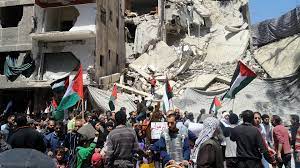
-
Published: 10 August 2022

The recent Israeli war in the Gaza Strip has had serious repercussions on the Gaza Strip's population of 2 million Palestinian refugees, and more than 1 million and 400,000 live inside 8 camps.
Mahmoud Khalaf, coordinator of the Joint Committee for Palestine Refugees, said Israel's recent war in the Gaza Strip had severely affected the refugees, especially since 70% of the Gaza Strip's population lived inside the camps.
The majority of the Gaza Strip's population had been significantly affected by food and health aggression, particularly with the closure of crossings 6 days before and 4 days during the aggression, resulting in food, health and relief crises in the Gaza Strip.
In the event of an expansion of aggression, UNRWA had spoken of a contingency plan and there had been displacement of refugees within the Agency's safe areas, given the criticism that had been levelled in the aftermath of the recent war and the lack of accommodation, protection and care of refugees within UNRWA schools.
The Agency announced urgent assistance to the owners of destroyed homes during the coming period and accounted for the damage of the recent aggression against the Gaza Strip, in direct coordination with the Palestinian Ministry of Works.
He continued: "After several meetings, the Agency had prepared a plan to counter the aggression, including preparation for the circulation of various service numbers, opening health clinics in various areas and preparing for relief to Palestinians during the blockade, but the aggression did not prolong, as in the previous war, and lasted only for 3 days."
On European support for the agency, Khalaf stressed that it did not concern those affected by the recent war, but rather related to the EU's share of the agency's general budget of 261 million euros in 3 years, in addition to providing 15 million for the relief of those affected by malnutrition as a result of the blockade and the coronavirus crisis.
